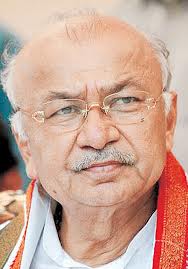New Delhi, Sep 19: The CBI on Thursday gave a clean chit to Home Minister Sushilkumar Shinde in the Adarsh Housing Society scam.
The agency informed the Bombay High Court that there is no evidence to suggest that Mr. Shinde during his tenure as Maharashtra Chief Minister abused his position as a public servant.
This was stated by the probe agency in an affidavit filed by it in reply to an application submitted by social activist Pravin Wategaonkar seeking that Mr. Shinde be included as an accused in the case, as he allegedly owns benami flats in the plush 31-storey Adarsh building in south Mumbai.
“CBI does not feel it legally necessary to name Sushilkumar Shinde as an accused person in the ongoing investigation being carried out by it,” the affidavit states.
According to Mr. Wategaonkar’s application, Mr. Shinde had suggested inclusion of late Major N.W. Khankhoje as a member of the Adarsh society.
Former MLC Kanhaiyalal Gidwani had deposed before the Adarsh commission that Mr. Shinde had asked for inclusion of Mr. Khankhoje as member.
“Khankhoje’s membership may have been pursued by K.L. Gidwani but it cannot be confirmed as Gidwani has passed away. The CBI charge sheet states that civilian members in the society were included at the instance of Gidwani,” the affidavit reads.
“Investigation conducted by CBI does not reveal any family relationship between Khankhoje and Shinde. There is nothing on record to substantiate deposition made by Gidwani to the commission that Khankhoje was included by Sushilkumar Shinde,” the affidavit filed by K. Babu, senior CBI official, states.
“There is no evidence coming to light during investigation to suggest that Shinde abused his position as public servant for the benefit of someone from Khankhoje family in connivance with the office bearers of Adarsh,” the affidavit states.
The affidavit further says that the agency does not see any merit in the allegations levelled against Mr. Shinde in the application.
Mr. Wategaonkar, in his application, had also stated that Mr. Shinde during his deposition before the commission had said that the Adarsh file had come to him for clearance.
After going through verification from the collector and officers of the revenue department, Mr. Shinde saw that only 20 of the 71 approved members were found eligible and had asked for a recheck on eligibility of the other 51 members.
According to Mr. Wategaonkar, this alleged act of Mr. Shinde insisting on 51 members to be rechecked/ substituted before possession of land to be given to Adarsh Society resulted in illegal benami transaction in respect of flats.
“There is nothing on record to suggest that Shinde had insisted on 51 more members by rechecking/substituting ineligible members before possession of land to be given to Adarsh society which resulted in addition of illegal benami members,” CBI said in its affidavit.
A division bench of Justices P.V. Hardas and P.N. Deshmukh on Thursday adjourned hearing in the case till September 26.





Comments
Add new comment